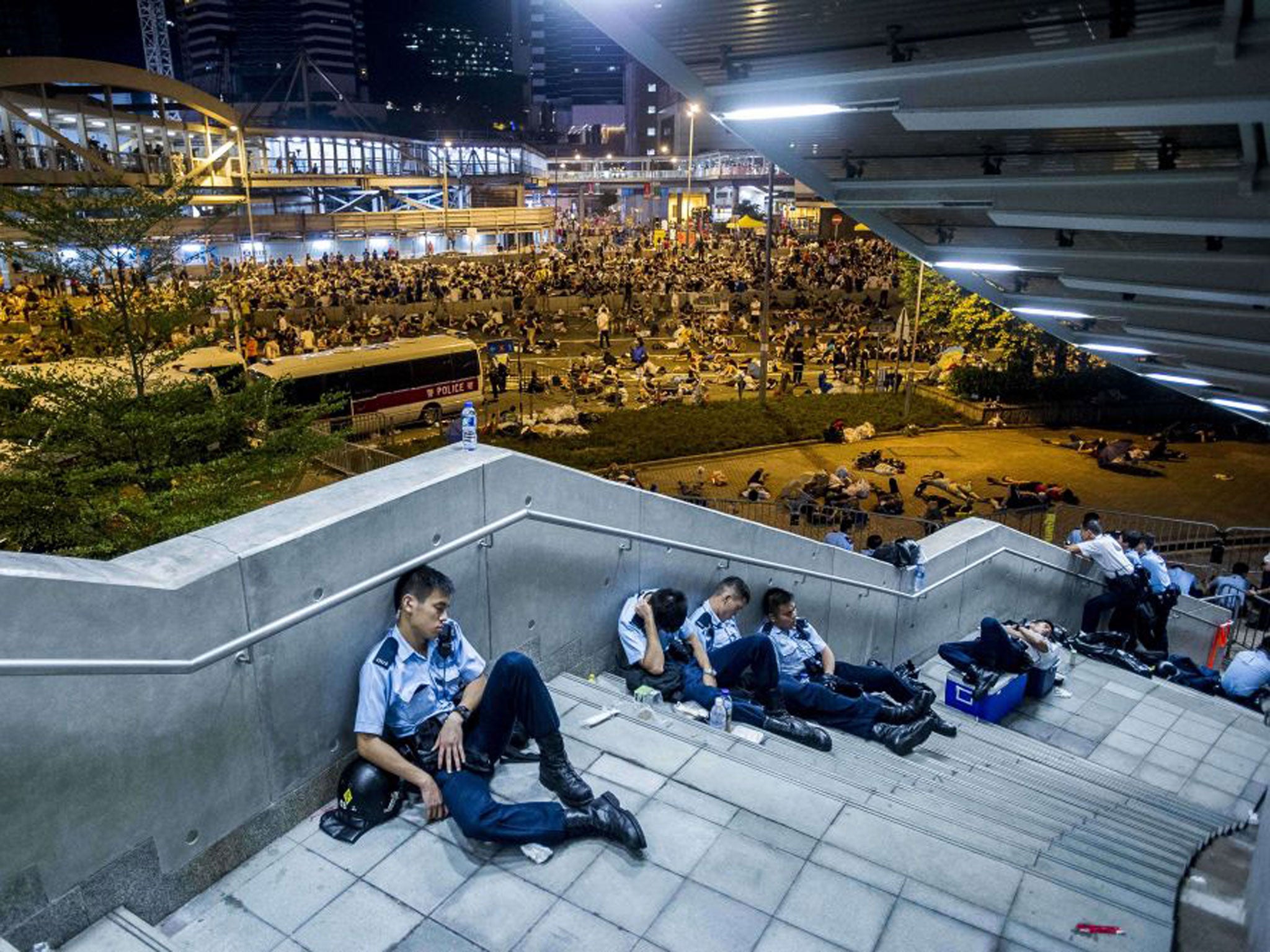Hong Kong protests: Leung Chun-ying denies Chinese troops will help to quell demonstrations
Riot police stood down, but Beijing fears concessions will encourage further protests

Your support helps us to tell the story
From reproductive rights to climate change to Big Tech, The Independent is on the ground when the story is developing. Whether it's investigating the financials of Elon Musk's pro-Trump PAC or producing our latest documentary, 'The A Word', which shines a light on the American women fighting for reproductive rights, we know how important it is to parse out the facts from the messaging.
At such a critical moment in US history, we need reporters on the ground. Your donation allows us to keep sending journalists to speak to both sides of the story.
The Independent is trusted by Americans across the entire political spectrum. And unlike many other quality news outlets, we choose not to lock Americans out of our reporting and analysis with paywalls. We believe quality journalism should be available to everyone, paid for by those who can afford it.
Your support makes all the difference.Tens of thousands of pro-democracy protesters remained on the streets of Hong Kong for a fourth night on Monday, defying calls for them to disperse as the biggest challenge to Beijing’s authority in 25 years continued to swell.
The huge show of defiance is in response to Beijing’s decision to allow only vetted candidates to stand in elections in 2017 after previously promising “universal suffrage”.
Pro-democracy campaigners say this will ensure that only those who support the government in Beijing will be allowed to stand. They are demanding a free choice of candidates for the role of chief executive.
Last night the protests had spilt out of the central financial district on Hong Kong island, one of the world’s biggest business hubs, and into other key areas. Some banks have suspended trading, shops closed early and some schools will remain closed today.
Police said they used 87 rounds of tear gas on Sunday night in what they said was a necessary but restrained response to protesters’ efforts to push through cordons and barricades. They said 41 people were injured, including 12 police officers. Pepper spray was also used and protesters were baton charged.
Last night, however, the riot police were stood down as the use of tear gas appeared to have backfired. The crowds grew as people finished work and joined weary-looking students camped on major roads near the city’s government headquarters and in several other parts of Hong Kong.
“The students are protecting the right to vote, for Hong Kong’s future. We are not scared, we are not frightened, we just fight for it,” said Carol Chan, a 55-year-old civil service employee who took two days off to join the protests after being angered by the police use of tear gas.
China has called the protests illegal and endorsed the Hong Kong government’s efforts to quell them, saying they are undermining the city’s image as a safe financial haven. Beijing has taken a hard line against perceived threats to the Communist Party’s monopoly on power. This is the biggest challenge since Tiananmen Square in 1989, which ended in a massacre. A similar outcome this time would be a disaster for Hong Kong’s reputation and for Beijing. But if the protesters succeed, democracy activists on the mainland will be emboldened.
Hong Kong’s chief executive, Leung Chun-ying, was forced to deny rumours on Monday that the Chinese army might intervene. “I hope the public will keep calm. Don’t be misled by the rumours,” he said.
China has also warned other countries not to interfere, after the UK Foreign Office said it was “concerned” about the violence in its former colony. It called on the authorities to preserve long standing freedoms by a move to “universal suffrage”.
Instead of candlelight on MOnday night, protesters staged “mobile light” protests, holding up their mobile phones with their screens glowing.
Protest leader Benny Tai, a founder of the Occupy Central campaign, also called on Mr Leung to step down. Addressing crowds on Monday night, he also condemned the use of force on Sunday. “People use peace and hope, while the government used tear gas and pepper spray,” he said.
On Sunday night protesters wore rain capes, surgical masks and swimming goggles and used umbrellas to shield themselves from the tear gas and pepper spray.
While many residents support the calls for greater democracy – dubbed the “umbrella revolution” although the crowds’ demands fall far short of revolution – not everyone supports the protests.
In an email to the BBC a resident called Cyrus Chiu said: “I am one of the silent majority who would not take part in the riot because Beijing has already made one major concession by allowing the people to vote in choosing our next chief executive.
“You may argue that only two or three nominees are allowed for us to choose, thus virtually barring any chance for a pro-democracy candidate to be considered.
“Yet every citizen does have one vote, and this right to choose our own leader is unprecedented throughout the 200-year history of Hong Kong,” he said.
Join our commenting forum
Join thought-provoking conversations, follow other Independent readers and see their replies
Comments